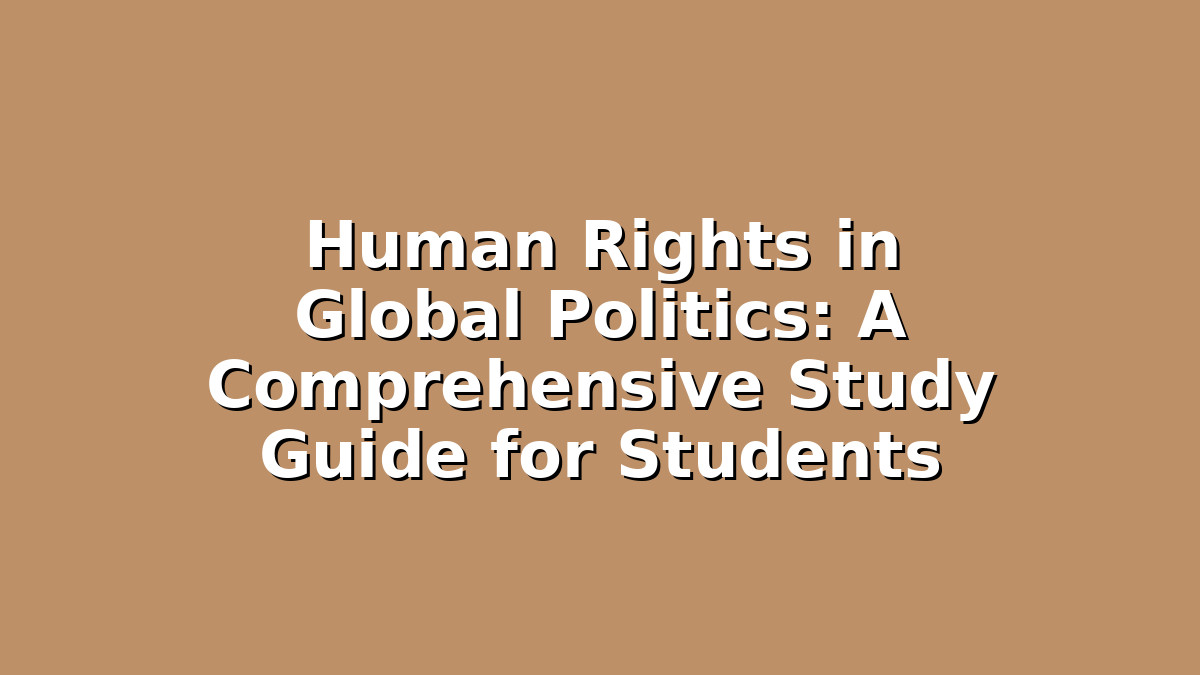Understanding human rights in the context of global politics is essential for students preparing for exams in subjects like political science, international relations, or history. This topic not only forms a significant part of many curricula but also helps build a deeper awareness of how countries interact with one another regarding the protection and violation of fundamental rights. This guide will break down the key concepts, offer detailed sections on critical areas to focus on, and provide study tips to help you excel in your exams.
Introduction
Human rights refer to the basic rights and freedoms that belong to every person in the world, from birth until death. These rights are universal, meaning they apply to all people regardless of nationality, ethnicity, gender, or religion. In global politics, human rights become a fundamental issue because they influence international laws, treaties, and diplomatic relationships.
For students, understanding human rights within global politics means grasping how these rights are protected or violated on the world stage, examining the role of international organizations, and learning about the challenges faced in enforcing human rights worldwide. With exams approaching, it’s crucial to break down the topic into manageable parts and apply effective study techniques.
Section 1: Understanding the Foundations of Human Rights
Before diving into the political aspects, students need a solid understanding of what human rights are and their historical development.
Key Concepts to Focus On:
– The Universal Declaration of Human Rights (UDHR)
– Natural rights vs. legal rights
– Civil, political, economic, social, and cultural rights
– The evolution of human rights post-World War II
Study Tips:
– Create flashcards with key terms and definitions such as “Universal Declaration of Human Rights,” “Article 3 (Right to Life),” and “International Covenant on Civil and Political Rights.” Flashcards help reinforce memorization and recall.
– Use timelines to chart significant events in the history of human rights. This visual aid can help you understand how human rights concepts evolved, especially after major events like the Holocaust.
– Summarize articles of the UDHR in your own words. Paraphrasing helps deepen your understanding and prepares you to answer essay questions or explain concepts clearly.
Human rights form the foundation of global politics because they create the standards by which states are judged. Without a clear grasp of these foundations, it’s difficult to understand subsequent political debates and conflicts.
Section 2: The Role of International Organizations in Protecting Human Rights
International organizations play a critical role in promoting and protecting human rights across nations. For students, it’s important to know the main actors and how they operate within the complex system of global politics.
Key Organizations to Study:
– United Nations (UN), especially the Human Rights Council and the Office of the High Commissioner for Human Rights (OHCHR)
– International Criminal Court (ICC)
– Amnesty International and Human Rights Watch (though non-governmental, these groups influence global politics)
– Regional bodies like the European Court of Human Rights and the African Commission on Human and Peoples’ Rights
Study Tips:
– Make a comparison chart listing the mandate, structure, and influence of each organization. This helps differentiate their roles and understand how they complement or conflict with each other.
– Watch documentaries or interviews featuring UN officials or activists. Engaging with real-world examples deepens your understanding of how these organizations work.
– Practice writing short answers explaining the successes and limitations of these bodies. For example, you might outline why the ICC struggles with enforcement or how Amnesty International brings global attention to abuses.
Exam questions often ask for examples of how international bodies have succeeded or failed in protecting human rights. Being able to cite specific cases or resolutions will add strength to your answers.
Section 3: Challenges and Controversies in Enforcing Human Rights Globally
While human rights are widely accepted as universal, their enforcement is fraught with difficulties. Politics, power dynamics, sovereignty, and cultural differences all influence how human rights are respected or violated.
Important Challenges to Explore:
– State sovereignty vs. international intervention
– Cultural relativism and the debate over universalism of human rights
– Political interests and selective enforcement
– Human rights violations in conflict zones (e.g., Syria, Myanmar, Yemen)
– The impact of globalization and technology on human rights
Study Tips:
– Develop case studies on specific conflicts or incidents involving human rights violations. Detail the political responses and international reactions to understand complexity.
– Engage in group discussions or debates to explore different viewpoints, such as the tension between respecting cultural traditions and enforcing universal rights.
– Create mind maps linking challenges to consequences and possible solutions. This visual method helps organize your thoughts for essay writing.
When preparing for exams, focus not just on memorizing facts but on understanding why enforcement is difficult and how political considerations shape outcomes. This analytical approach impresses examiners and deepens your comprehension.
Conclusion
Human rights in global politics is a rich, complex topic that requires both knowledge and critical thinking. By mastering the foundations of human rights, understanding the role of international organizations, and analyzing the challenges in enforcement, students can prepare effectively for their exams. Use varied study techniques like flashcards, case studies, and visual aids to enhance memory and comprehension.
Remember, your understanding of human rights goes beyond exams—it shapes how you view the world and your role as a global citizen. Stay curious, keep practicing, and approach your studies with confidence. You’ve got this!

Responses